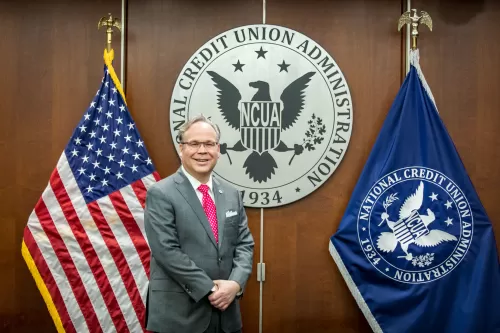NCUA Chairman Todd M. Harper at the NCUA's headquarters in Alexandria, Virginia.
As Prepared for Delivery on June 16, 2022
Thank you, Shameka and Robert, for your informative presentation on the National Credit Union Administration’s post-examination survey pilot and the next steps to refine this new feedback mechanism. Shameka, I also understand that this briefing was your maiden voyage at the NCUA Board table. Congratulations! You did well.
Since joining the NCUA Board eighteen months ago, Vice Chairman Hauptman has advocated for ways credit unions can provide constructive feedback on the agency’s examinations. I would like to thank him for this idea and his leadership in advancing this initiative. This successful pilot has demonstrated for me the value of collecting such stakeholder feedback, and we had much higher participation rates than prior efforts to assess examination performance.
The NCUA’s field examiners play a critical role in protecting credit union members, the system, and the National Credit Union Share Insurance Fund. Our examiners rely on training, experience, and, most importantly, good judgment when conducting examinations. In many ways, our examiners act like referees and umpires who must make calls on balls, strikes, fouls, and activities that are out of bounds. Being a referee is about fairness and making the right call. It is an often thankless and, at times, a difficult and disparaged job.
Like the evolution of refereeing in professional sports with instant replays and immediate external reviews of on-the-court calls, the NCUA has invested in technology and developed new procedures. These changes have sought to improve the effectiveness of the examination program, increase the fairness of examinations, and decrease subjectivity in examination reports.
For example, the agency implemented the National Supervision Policy Manual to ensure greater exam consistency across the country. We also improved examiner training, developed new analytical dashboards, approved regulations that clarify the role of supervisory guidance, and established procedures like requiring documents of resolution to link to a specific regulation. Additionally, we now include details about the agency’s appeals process in all examination reports. And, the NCUA has enhanced quality control reviews to ensure examiner findings are well documented, well written, and consistent with the agency’s operational policies.
Yet, there remains the perception by some within the credit union industry of inconsistency and micromanagement in NCUA examinations. This perception is partly expected due to the nature of the examination process. Nevertheless, the NCUA can and should seek to incorporate the feedback of credit unions and make appropriate improvements to the process.
Since last September, federal credit union managers and CEOs have received the piloted post-examination survey from the NCUA’s Ombudsman after their credit union’s regular examination. As noted today, we deployed three different surveys as part of this pilot. Each survey included five questions on the topics of pre-examination, reporting, and post-examination requirements, and one open-ended question to obtain feedback on questions the agency should consider for a permanent survey in the future.
When a post-examination survey was proposed and later approved as part of the 2021–2022 budget, I expressed some skepticism because a prior post-examination survey had received few responses and was, ultimately, not cost-efficient. However, the new post-examination survey the NCUA has piloted is well crafted, and it has provided valuable feedback on the agency’s program. And, the survey’s results demonstrate that examiners are performing well overall.
Before recognizing others, I have three questions for Shameka and Robert. First, your presentation noted that 186 stakeholders responded to the survey. What is a reasonable response rate for a survey like this one? What statistical baseline should the NCUA strive for to improve the examination program survey going forward?
Thank you for clarifying that point. When you were developing and implementing the pilot, what did you learn from other regulators that also have post-examination surveys? What lessons can we learn from their experiences?
Thank you for sharing those observations. Finally, how can the NCUA minimize costs and maximize responses to the post-examination survey going forward?
Thank you for making those suggestions, which I believe are critical to ensuring this promising post-examination survey does not one day turn into an irrelevant and ineffective exercise.
There is one final point I would like to make before closing. As the NCUA continues to conduct the post-examination survey, we should always remember the examination program’s primary goals of protecting credit union members, the system, and the Share Insurance Fund. Avoiding even the appearance of regulatory capture is in the best interest of the taxpayers who guarantee the Share Insurance Fund.
The NCUA must always remain a neutral referee calling the balls and strikes as it sees them. Fairness is not always popular, but it is essential for maintaining a safe, fair, strong, and sound credit union system.
That concludes my remarks. I now recognize Vice Chairman Hauptman.



